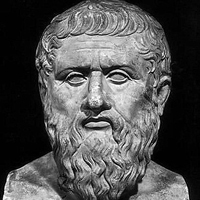Ion by Plato: Introduction
In ''Ion'', Plato's speaker Socrates converses with the accomplished rhapsodist, Ion, a professional reciter of epic poetry. Ion claims that he is a perfect critic of Homer's work and he knows everything about him.

Plato (427-347 BC)
But Socrates seeks to demolish Ion's claim that as a rhapsodist he is an expert critic of Homer and forces him to admit that he is not. Socrates will not allow Ion to argue that he is an expert on the poem as an object or an indivisible whole but for Socrates it is merely a collection of copies of ideas or forms. Socrates treats the poem only in terms of subject matter or content; he simply ignores its existence as a formal structure. Plato objected poetry on the grounds of its irrationality. This emphasis leads us to consider Plato to be the founder of the moralistic and didactic criticism that tends to separate form and content. Plato gives emphasize on content, and to erect external moral standards.
Plato's main concern in ''Ion'' is that art should be ceremonial (fit to be used in the festivals) otherwise it lacks the function. One like Ion, cannot judge the poets in isolation. Ion only knows about Homer and not about other poets. So he is not a critic, nor can he be any rhapsodist in its truest sense. The rhapsodist takes the thing by the heart not by the mind (head). Ion lacks the holism or the tradition Homer belongs to (this line has been developed by Eliot in the twentieth century).
Browse by Question
Plato Study Center
Position of Poets in Plato's Ideal State
The Allegory of the Cave: Meaning and Inerpretaton
 |
bachelorandmaster.com |